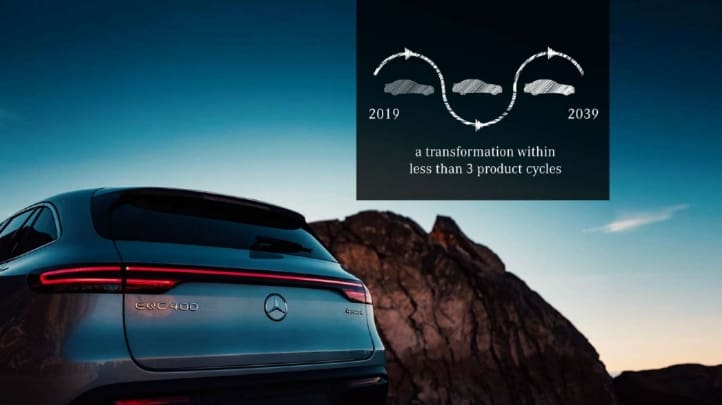Mercedes-Benz’s parent company Daimler has committed to making all cars across the brand’s portfolio carbon-neutral within the next two decades, in a move it has described as a “fundamental transformation” for the company.
The commitment has been dubbed the ‘most ambitious’ from a carmaker to date. Pictured: Mercedes-Benz’s fully-electric SUV, the EQC
The commitment will cover the manufacture, use and end-of-life stage for all branded cars initially, with Daimler also committing to work with suppliers in order to spur the creation of carbon-neutral supply chains in the future. Suppliers will be encouraged to disclose emissions information through CDP, while Daimler will conduct in-person workshops with key suppliers to co-create low-carbon solutions. The automaker is hoping to establish the publication of an ambitious CO2 reduction target as a pre-requisite for suppliers.
On carbon-neutral manufacturing, Daimler will switch all of its European car and battery plants to 100% renewable electricity by the end of 2022. It already runs its Sindelfingen plant, near Stuttgart, with 100% renewables, and uses wind to meet the majority of the power consumption at its Jawor production line in Poland. The company is additionally investing in scaling up recycling solutions, in a bid to recycle 85% of the materials used in each of its vehicles at the end-of-life stage within the next two decades.
Mercedes-Benz had already forecast that electric vehicles (EVs) are likely to account for at least half of its global car sales by 2030. However, for them to operate at a carbon-neutral status, they will need to be powered with renewables. Under its new pledge, the carmaker is therefore set to increase the promotion of its Mercedes Me Charge service, which allows users to see their local renewably powered charging points on a digital map. It will also work with competitors, energy suppliers and policymakers to lobby for greater investments in – and incentives for – carbon-neutral energy and supporting infrastructure.
As for its non-electric vehicle portfolio, Mercedes-Benz maintains that it will take a “tech neutral” approach to reaching carbon neutrality, also backing hydrogen fuel cells and “cleaner” diesel and petrol models. It will pay to offset any “residual” carbon emissions from these models through carbon credit schemes.
“To us, the Paris Agreement is more than an obligation – it’s our conviction,” Daimler’s member of the board of management for the research and development of Mercedes-Benz cars, Ola Källenius, said.
“However, this transformation is a huge challenge – technologically and financially. After all, we want to make sustainable mobility even more exciting, not more expensive. And of course this is also about sustainable business results. We’ll all have to get out of our comfort zones to find new ways to move forward.”
In order to engage its boardroom with the new pledge, dubbed Ambition 2039, Mercedes-Benz will link board-level employees’ pay packages to progress against its carbon reduction aims. Similar moves have been taken by the likes of Shell in recent times.
Carbon-neutral cars
The launch of Ambition 2039 comes shortly after competitor Volkswagen (VW) committed to launch at least 70 EV models by 2028, as part of a new ambition to become ‘climate-neutral’ by 2050.
The firm had previously pledged to bring 50 new EVs to the market by 2028 but is now aiming for 40% of its portfolio to be electrified by 2030 and to invest €30bn in e-mobility by 2023. It will then sequester or offset all remaining carbon emissions by mid-century.
Audi has also set a similar commitment to ‘climate-neutrality’ – which it defines as having carbon-neutral manufacturing status across all plants by 2030. The company is currently altering its energy purchasing agreements and investing in more onsite arrays as it works towards this goal, in a bid to meet all of its energy demands with clean power “as soon as possible”.
However, the We Mean Business Coalition’s chief executive Nigel Topping has claimed that Mercedes-Benz’s Ambition 2039 commitment is the most ambitious to have been set by any carmaker to date.
In a column for EURACTIV, he wrote: “Earlier this year, German automaker VW accelerated plans to electrify its fleet, committing to launch 70 fully electric models by 2028, up from an earlier pledge to sell 50 by 2025. VW also set long-term ambitions to make the entire company CO2-neutral by 2050, including its factories, offices and cars.
“The Daimler announcement brings forward this date by 11 years, demonstrating new leadership for the sector. Companies and countries that fail to … set a clear date for zero-carbon mobility in the 2030s will be the losers in this inevitable transition.”
Sarah George
Source: edie









